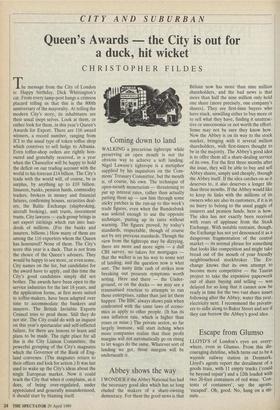Abbey shows the way
I WONDER if the Abbey National has had the necessary good idea which has so long eluded the makers of a share-owning democracy. For them the good news is that
Britain now has more than nine million shareholders, and the bad news is that more than half the nine million only hold one share (more precisely, one company's shares). They are first-time buyers who have stuck, unwilling either to buy more or to sell what they have, finding it unattrac- tive or uneconomic or not worth the effort. Some may not be sure they know how. Now the Abbey is on its way to the stock market, bringing with it several million shareholders, with first-timers thought to be in the majority. The Abbey's good idea is to offer them all a share-dealing service of its own. For the first three months after the issue, they will be able to buy and sell Abbey shares, simply and cheaply, through the Abbey itself. If the idea catches on as it deserves to, it also deserves a longer life than three months. If the Abbey would like to keep its links with the millions of its owners who are also its customers, if it is in no hurry- to belong to the usual gaggle of insurers and pension funds, here is how. The idea has not exactly been received with roars of applause from the Stock Exchange. With notable restraint, though, the Exchange has not yet denounced it as a dangerous fragmentation of the central market — its normal phrase for something that looks like competition and might take bread out of the mouth of your - friendly neighbourhood stockbroker. The Ex- change knows that its own attempt to become more competitive — the Taurus project to take the expensive paperwork out of share buying and selling — was delayed for so long that it cannot now be ready in time for the two vast share issues following after the Abbey, water this year, electricity next. I recommend the privatis- ers to sidle along to Baker Street and see if they can borrow the Abbey's good idea.


















































 Previous page
Previous page